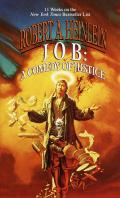Every accusation is a confession

The Republican nominee for President is losing his shit over the fact that he hasn't been able to kill the legal proceedings against him and that the public is learning more about what he did while criming. Here's one of his latest rants from "Troth-Senchal," his failing social media platform:
The release of this falsehood-ridden, Unconstitutional, J6 brief immediately following Tim Walz’s disastrous Debate performance, and 33 days before the Most Important Election in the History of our Country, is another obvious attempt by the Harris-Biden regime to undermine and Weaponize American Democracy, and INTERFERE IN THE 2024 PRESIDENTIAL ELECTION. Deranged Jack Smith, the hand picked [sic] Prosecutor of the Harris-Biden DOJ, and Washington, D.C. based Radical Left Democrats, are HELL BENT on continuing to Weaponize the Justice Department in an attempt to cling to power. “TRUMP” is dominating the Election cycle, leading in the Polls, and the Radical Democrats throughout the Deep State are totally “freaking out.” This entire case is a Partisan, Unconstitutional, Witch Hunt, that should be dismissed, entirely, just like the Florida case was dismissed!
There's one true nugget in that rant, though it is festooned with inappropriate capitalization: the upcoming election is, indeed, the most important presidential election in history (because if this clown wins it, America as we know it is over). Everything else is typical Trumpian horse excrement. But it does illustrate continuing patterns, including the projection of his own past and planned wrongdoings and criminality onto his opponents.
"Falsehood-ridden" is a kind term to describe nearly anything Donald Trump says in any context. Projection.
"Unconstitutional" is in some ways meaningless coming from him, as he had no idea what the Constitution says aside from a cherry-picked sentence here or there, but violating the Constitution is like breathing for Trump. He violated his oath to it countless times during his term in office. Projection.
I will agree that Governor Walz's debate performance was less than perfect, but he held his own, while VonClownstick's own debate performance was staggeringly awful. Projection.
The nearness to the election of the release of the legal brief he's talking about is his own fault, aided by the three Supreme Court Justices he installed. Trump and the super-majority of corrupt Justices caused the delays that brought things to basically a month from election day. Not quite projection, but certainly gaslighting.
Interfering in the 2024 election is and has always been his plan. Just listen to him tell people at his rallies that he doesn't need their votes, that he already has "plenty of votes." Why doesn't he need their votes? Because his plan is to ignore votes and cheat, and he has minions in swing states creating obstacles to voting and putting thumbs on the scales and introducing chaos to the proceedings for the purpose of making voting unreliable and suspect. Projection.
"Radical" Democrats? Please, this guy is an authoritarian fascist. Projection.
"Witch hunt" is a favorite term of his, used apparently without intended irony; investigations of his criminality are backed by mountains of evidence, but his own attempted takedowns of Joe Biden, Hunter Biden, Alvin Bragg, Anthony Fauci, and who knows how many others—even Mark Zuckerberg, of all people!—are based in nothing more than the whining grievances of a bully not permitted to bully with unchecked impunity. Projection.
Finally, weaponizing the Justice Department is one of Donald Trump's core policy planks. He's attempted it (both successfully and unsuccessfully) during his term in office and he promises to do it again, this time without pesky DOJ officials that tell him he can't do it. Massive projection.
On that last point, the New York Times—a publication that for some reason refuses to acknowledge the reality of Donald Trump's anti-American fascist dictator-worship—surveyed a number of former DOJ officials about Trump's plans for weaponization. I turn the analysis of that piece over to the great Craig Calcaterra:
The Times spoke with 50 former top officials from the Justice Department and the White House Counsel’s Office to try to game out how Donald Trump would, as he promises he will, use the FBI and the DOJ to go after his political enemies should he be elected. The upshot of these people’s opinion:
Forty-two of the 50 former officials said it was very likely or likely that a second Trump term would pose a significant threat to the norm of keeping criminal enforcement free of White House influence, a policy that has been in place since the Watergate scandal.
Thirty-nine of 50 said it was likely or very likely that Trump, if elected, would order the Justice Department to investigate a political adversary. (Six more said it was possible.) This, too, is something presidents don’t do.
The respondents were more split on how the Justice Department would respond. Twenty-seven of the 50 said it was very likely or likely that career prosecutors at the DOJ would follow orders and pursue the case. Thirteen said it was possible. Nine said it was unlikely or very unlikely.
Some of the people the Times spoke to blithely assert that Trump wouldn’t do this or that, even if they cannot point to formal mechanisms barring him from doing so. Indeed, they believe that people in the FBI and Justice Department would somehow do the right thing and stop Trump from doing what he says he wants to do. I cannot for the life of me understand how anyone who lived through Trump’s presidency can believe such nonsense but I suppose it’s pretty easy to be a Pollyanna about such things when you’re otherwise comfortable.
Personally, I prefer to believe what I see before my very eyes. And what I see is a man who has vowed to weaponize the Justice Department to go after his critics and enemies and has further vowed to use shock troops to round up minorities — including immigrants with legal status — and place them in concentration camps and subsequently deport them. A man who has promised to stretch the powers of the presidency in ways not seen in our lifetime. A man who, thanks to our corrupt Supreme Court, can now be confident that no one will be able to challenge his doing so. Again: this is not conjecture. He has openly and repeatedly promised this. He has promised to usher in what is, by any rational definition, authoritarianism and fascism.
This is not some conspiracy theory about a covert plot. It is not hidden. Donald Trump is saying it loud and clear. Most of the people who know how the system works believe he’ll do it. We had best listen.
I make it a point never to argue with Craig when he's right.
No Comments yetThe Veep Debate and Wild Card Playoffs
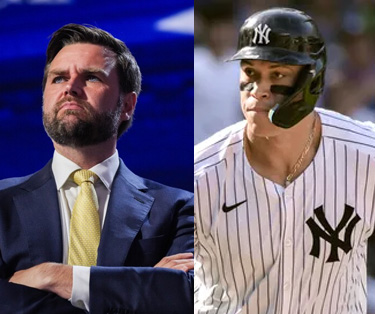
Left: Literal evil. Right: Metaphorical evil.
I really tried to watch the whole thing.
Well, "really tried?" I mean, I could have pushed through. I chose not to for the sake of my blood pressure and my downstairs neighbor, who was probably sick of my screaming "go to hell you lying son of a bitch/smarmy troll/piece of excrement" etc. every two minutes or so.
But I turned it off, "it" being the so-called debate between Vice-Presidential nominees Tim Walz and J.D. Vance. Had I kept on, I would have seen Walz be better; early on he was obviously nervous and appeared out of his depth, but I know from post-debate analysis and the slew of clips that made it around the Internet and cable news that he improved markedly in the second half. Had I kept on, I would also, however, continued to see Vance pour on the bullshit in such a slick, phony faith-healer way, with an abundance of the sort of charm you might find in a sociopathic used car dealer determined to have you drive this lemon off the lot and be happy you did it.
Vance is like a lot of modern-day Republicans in that he can seemingly get away with saying the vilest, most repugnant things so long as he says it in a calm, thoughtful-sounding tone. The film Vice captured this in its portrayal of Dick Cheney, but it's the same schtick you hear form Bill Barr, Kevin McCarthy, even Steve Bannon (though his weird triple-shirts get in the way of seeming sane). But there was Vance, claiming in a calm tone with as straight a face as he could muster that Donald Trump saved the Affordable Care Act (when he actually tried his damnedest to destroy it), peacefully left office (when he actually incited an insurrection to try to stay in power), and didn't crash the economy (when he in fact presided over a massive manufacturing recession, waged a trade war that cost taxpayers billions, and so botched a global health crisis that everything went into the tank not to mention cost hundreds of thousands of lives). The smarmy, lying, weasel. And there were the alleged journalists acting as "moderators," treating a 35-year-old misstatement on a matter of no importance by Governor Walz with the same heft and importance—greater heft, arguably—than the mountain of deceit, lies, gaslighting, and revisionist history being spouted by the opposing campaign on a daily, nay, hourly basis.
Fortunately, it seems the public saw through Vance's facade of crap and credit Walz with authenticity from the event. I admit to being a little surprised at that, given how easily manipulated 70+ million people were in the 2020 campaign. The stakes being what they are, it's no wonder Governor Walz was nervous stepping onto that stage and thank god/fate/whatever he was able to hold his own against Weasel McPantsonfire.
Anyway, I couldn't take it, so I switched over to baseball.
This is now the third year of the "Wild Card Series" in the Major League Baseball postseason and I remain against it. We did have, for the first time, one series go the distance of three games, with the New York Mets pulling out a come-from-behind win to move on earlier this evening; meaning in the 12 WC series to date, the team that did not advance was won one game and the team that lost the first game has advanced zero times. You might say the sample size is still too small, but I say that pretty much negates the argument some had been making about the previous one-and-done Wild Card game setup being somehow less fair than a best-of-three, like we have now. And, illustrating another glaring flaw in the system, the division winners forced to play on the same level as the Wild Card teams were both ousted, meaning that now a division winner has been eliminated before the Division Series 2/3 of the time. (Not that I'm sad to see Houston lose, though. That's a silver lining this year.)
I've gone on at length before about how this is a dumb system that Commissioner Manfred has saddled us with and how it could be better, so I'll go on here only briefly. But it stinks for the fans in Milwaukee to see their team, which dominated its division all year long, bounced out in consecutive years by teams that won nothing in the regular season. Finishing first needs to actually matter. Advancing as a Wild Card team needs to be harder. Again, briefly, if we must have these stupid expanded playoffs, I want to see (for practical reasons only) four WC teams per league instead of three; all division winners skip the WC series; and no offdays for WC teams. Play the day after the regular season to winnow four WC teams to two, survivors play the next day to determine who gets the single WC berth in the Division Series, then straight in to the DS without any rest, meaning any WC team to advance to an LCS needs a deep starting rotation and a capable bench. Also, as a side benefit, this shortens the arguably-disadvantageous layoff for the "bye teams" (division winners) by three days.
Too obvious?
Anyway, it is what it is this year, and we get an 8-team bracket of finalists with no obvious rooting interest for your's truly. Do I support Detroit as the upstart come-from-nowhere surprise club? The loaded lineup and battered pitching staff of the Dodgers? Cleveland's a possibility now that they've rebranded away from racism; rookie manager Steven Vogt and star power in José Ramírez and Steven Kwan are certainly appealing. KC has Bobby Witt Jr. and a lot of moxie. I don't know, I guess it'll take shape in my head as the series get underway. But I do agree 100% with Michael Schur of The Poscast: No matter how "appropriate" it may seem for the World Series to feature two megastars against each other in Shohei Ohtani (Dodgers) and Aaron Judge (Yankees), there is no universe in which the Yankees deserve another pennant, not for decades to come.
No Comments yetState of the M's
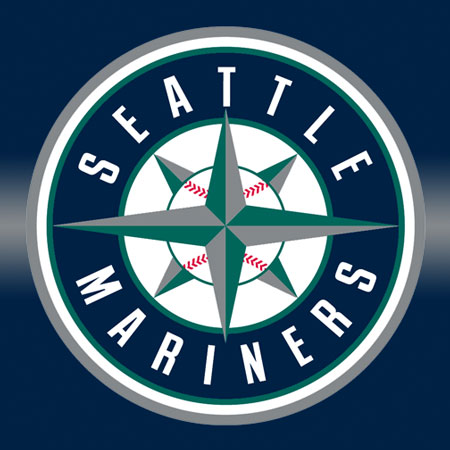
Tonight was the last Friday of the baseball season, and thus Fan Appreciation Night down at the ol' ballpark. Many prizes are given away at Fan Appreciation Nights, but in decades of attendance I have yet to get one. (Though my seats did get one some years back, but it wasn't the one I was sitting in, Bill got it, winning a suite for a game the following April. I and some mutual friends went with him, so it's sort of like winning a prize, I suppose.) I didn't win anything tonight, either, but the Mariners did eke out a victory over the Oakland-for-two-more-days Athletics.
Not that it mattered, as the M's were eliminated from postseason contention yesterday. The entire American League playoff field was set before tonight's first pitch, and most of the National League field as well (the remainder there may well still be in flux after Sunday's games are done as the currently-in-a-three-way-tie-with-Arizona-for-two-slots Mets and Braves have a makeup doubleheader to play on Monday). Still, it was a nice evening and Bryan Woo pitched a great game.
But as we come to the end of the 2024 campaign, some thoughts on the state of the Mariners:
Much was made about the Mariners' rebuild following the 2018 season having the goal of contention within three years. Despite the COVID-truncated season of 2020, they basically achieved that, winning 90 games in ’21 and then again in ’22, making the ’22 postseason thanks to the dumb expanded Wild Card system we're now stuck with. Last year the M's were alive until the final day of the season, finishing one game back of the last WC berth with 88 wins. All of which was utterly astounding when you think about it; how they won that many games with lineups that put up truly atrocious numbers not just once, but three years running, is downright weird.
Then-manager Scott Servais got a lot of credit—undeservedly—for those win totals. The thinking seemed to be, "wow, how good is Servais, look what he did with an offense that was at or near the bottom of the league rankings." But that was backwards. You look at those teams in the preseasons and you'd figure them to be far better than they turned out to be; maybe not World Series-caliber lineups, but certainly playoff quality in today's expanded-postseason universe. The real evaluations should have been, "wow, how bad is Servais, look how few runs his teams scored despite that group of players. If not for that incredible pitching staff he'd be lucky to sniff .500." It took until three-quarters of the way through this season for the club's top brass to figure out that the way Servais ran things was never going to work. You can't get a lineup to hit when you essentially tell all your batters to emulate the late Joaquin Andujar—an All-Star pitcher in the 1980s who's approach with the bat was "swing hard in case you hit it"—and make your goals about "launch angles" and "barrel rates." Good pitching can take you a long ways, but you still have to score more runs than the other guys.
The post-’18 rebuild, which went on through the short 2020 season, was supposed to form a core of players who would mature into a contending team with a solid window of opportunity lasting at least five years, after which time some or all of that core will have become financially burdensome. That window might be starting to close now, but some of those supposedly core players are already gone, given up for failures after underachieving with the broken Servais regime: Ty France is a Cincinnati Red and was doing quite well until going into a slump in the last two weeks (.312/.358/.475 as a Red through Sept. 10th, 7-for-50 since then). Jarred Kelenic, who may have been forever ruined by the Mariners' handling and rushing of his development time or might have been a bust regardless, is an Atlanta Brave relegated to their bench. Injury-plagued Kyle Lewis might never play in the bigs again, but if he does it'll be with the Diamondbacks. Lewis was just one of those prospects that couldn't get healthy. Kelenic may or may not be one of those personalities that just wouldn't ever succeed in the Majors. Cutting bait with them is understandable. Losing France was just plain stupid, but I wonder if that move was requested by Servais or a misstep by the higher-ups based on a performance that they didn't understand was being hampered by Servais and his alleged hitting coach, Jarret DeHart.
Anyway, there's still plenty of talent on the club to continue and even expand the window of opportunity. President of Baseball Ops Jerry Dipoto has, aside from dealing France away, done fairly well in adjusting personnel as needed, and with a young starting rotation that could remain together for another few years (possibly sans Luis Castillo) even an average lineup should be able to contend. Most importantly, Servais and DeHart were finally shown the door, which if nothing else is addition by subtraction. Things actually look better than they have in 20+ years for the Seattle Mariners going into 2025.
Biggest offseason questions for the M's:
- Does Edgar stay? Edgar Martínez only agreed to return as batting coach for the remainder of 2024. Can manager Dan Wilson talk him into staying on? If not, who becomes the batting coach? The four-plus years of DeHart showed how unequivocally necessary a competent batting coach is, so if Edgar does not choose to stick around, this is their biggest "free agent" need. They need someone with a lot of pro hitting experience, preferably someone who had to work for his successes over a long career. I don't know if Terry Pendleton would be interested, he is in his 60s now, but he'd be an interesting ask. Ditto Milt Thompson. Raúl Ibañez seems more interested in front-office gigs than coaching, but I wonder if he'd be a good batting coach? I mean, so long as he doesn't take up that disgusting chewing tobacco habit again.
- Who's on first? Having thrown Ty France away for whatever dumb reasons, first base is now essentially vacant, having been manned down the stretch this year by rental player Justin Turner and outfielder Luke Raley. Raley could potentially transition into a regular fixture at 1B, but defense would be lacking in that case. Is young Tyler Locklear a viable option? He flopped in a short stint with the M's this year, but has OK-to-decent numbers at Triple-A, especially on-base percentage (.371, 70 games), after great ones at Double-A (.291/.401/.532, 41 games). Seems to me a full year at Triple-A would be in order, but the M's do like to rush guys.
- Jorge Polanco: Cut or don't cut? The second baseman's contract has a team option for 2024 at his same $12M salary, or that option can be bought out for $750k. Personally, I'd choose to buy out the option and use the money elsewhere, then use Spring Training as a tryout camp for the position. If he's healed up from his Achilles injury, try switch-hitting Sam Haggerty there. He can compete with Ryan Bliss, Leo Rivas, and the somehow-still-in-the-mix Dylan Moore and maybe some non-roster invitees from the big-league scrap pile.
- OF logjam: You know Jerry Dipoto is going to trade somebody, he always does. Seems likely that someone from the outfield mix will be dealt somewhere as there's a surplus with Julio Rodríguez, Randy Arozarena, Victor Robles, Mitch Haniger, and Raley on the big-league roster and Dom Canzone, Cade Marlowe, and Samad Taylor at Triple-A. Julio and Victor aren't going anywhere, so Haniger and Arozarena appear to be the likeliest to move; Arozarena would have the most value despite his down year in ’24. A return could be sought in a first- or third-baseman or prospects.
Just having a real batting coach and a manager that doesn't leave his brain in the clubhouse for an entire season will elevate the M's considerably from their disappointing 2024. They could make no moves at all and that would be enough to contend. But moves will be made, a budget will be dictated, some things will change. I just expect them to be relatively minor.
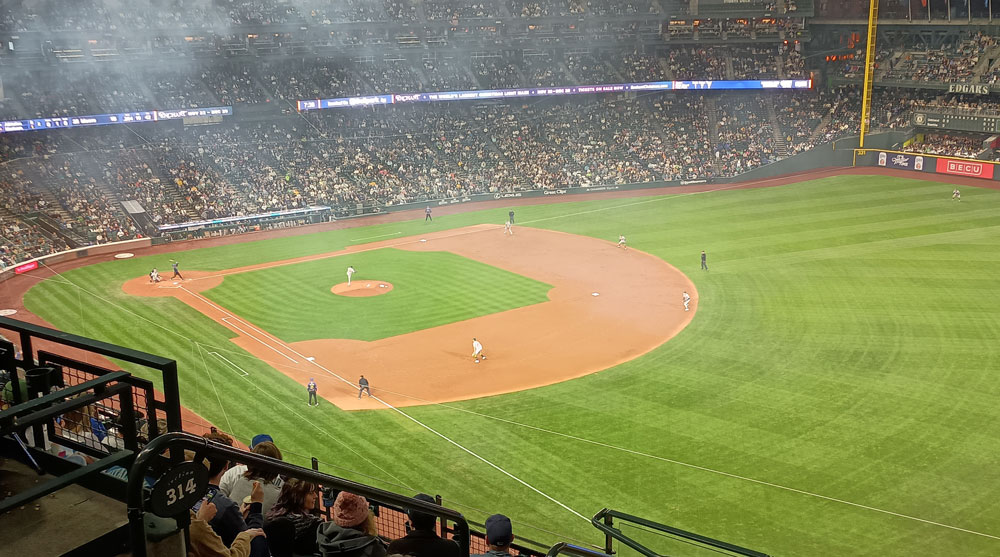
The Edgar Effect

Edgar Martinez, back as Seattle batting coach (and not a moment too soon)
It's now been nearly a month—25 days, to be exact—since the Seattle Mariners finally got around to firing their manager (Scott Servais) and alleged hitting coach (Jarret DeHart) and replacing them with former Mariner players Dan Wilson and Edgar Martinez, respectively. I said at that time that despite their poor standing the change made me more bullish on the potential of the Mariners making the postseason than I'd been in months, and now, after 25 days, how are things looking?
Well, not great. But a better grade of not-great than before, to be sure.
Currently, the M's are four games over the .500 mark and 2 games out of a postseason berth (the ridiculous third Wild Card) with 12 games left to play. When Wilson took over, the team was at .500 and five games back of playoff standing. So it is marginally better, but time is running out, and it would still be a bit of an upset if they managed to get into the October tournament.
But the difference aside from the standings isn't marginal, it's enormous.
That improvement is, naturally, in the offense. Edgar taking over from the woefully ill-equipped DeHart as batting coach has changed the whole way of thinking for the team, away from the stupid stuff like launch angles and barrel rates and back toward the important things like contact and situational awareness. Here's a very simple stat to show the change in attitude:
Under Servais/DeHart: 18 sacrifice flies (128 games)
Under Wilson/Martinez: 11 sac flies (22 games)
That's a 500% increase in the simple act of getting a runner home from third base with a fly ball. Productive outs in general has been a key point in Edgar's tutelage so far, which you'd think would be a basic, known element for batters, but under DeHart the very idea was apparently discouraged.
But it isn't just making better outs that's improved, far from it. All team batting stats have been raised since Edgar came back to the dugout:
Team slash line under Servais/DeHart: .216/.301/.365
Team slash line under Wilson/Martinez: .254/.354/.416
Runs per game? Up from 3.9 to 5.2. Hits per game, walks per game, RBI per game, doubles per game, homers per game, all up. And strikeouts per game are down, though not significantly yet thanks to one 17-K game against the Rays; if you take that outlier out of the mix, Ks per game are down from 10.2 to 8.6. Still a ways to go on that front, but the way the rest of it is trending, that'll come in time.
Certain individual batters have gotten impressive results from consulting with the Hall of Famer, most notably Julio Rodríguez, Mitch Garver, and Luke Raley. Before the regime change, Julio was batting .260/.310/.364. Since the changeover, he's batting .278/.356/.489. It's the middle number, the on-base, that really stands out to me. Garver was having the absolute worst year of his career, and with no one to turn to for help was just getting worse and worse; he was at a miserable .165/.287/.327 under the old guard. With Dan and Edgar, his line is .267/.353/.433. Yes, only 34 trips to the plate, but what a difference. Then there's Raley, who had started out strong in the early season—a high-water mark of .301 in late May—before slumping down into the .220s. What's he done since Dan and Edgar took over? .304/.403/.679 with 15 RBI.
Victor Robles is another guy with huge numbers since Dan and Edgar arrived, but he's been the best hitter on the club basically since he got to Seattle at the beginning of June so it's not as clear that it's an Edgar influence. Still, check it out—Pre-Dan and Edgar: a very good .280/.340/.413; since Dan and Edgar: an astonishing .473/.546/.636.
Other guys aren't seeing big bumps in their numbers, but still some things of note, e.g. Cal Raleigh's average is still anemic, but his on-base mark has gone from a pre-change .303 to a since-then .341; newcomers Randy Arozarena and Justin Turner weren't around long during the Servais/DeHart time, so the comparison doesn't track, but Arozarena's slugged 100 points higher since the change and Turner's post-change slash is a stellar .290/.386/.464.
The Mariners as constructed throughout the year have had plenty of talent in their lineup, they were simply underachieving. Guys who were slumping or falling into bad habits had no one in-house to go to for help and things never got any better. Now they do. And we're starting to see who they really are.
It might be too late for 2024, but it bodes well for 2025.
2 Comments
Demolition derby

I had umpiring to do last night, so it wasn't until the wee hours of this morning that I finished watching last night's debate between VP Kamala Harris and convicted felon F*%face VonClownstick. It wasn't perfect, there were things I was disappointed not to see, and of course I spent too much energy yelling at the TV when the man in the swirly combover was spewing bullshit at us. (So much so that about ten minutes in I got a text message from my neighbor downstairs asking, "catching up on the debate?" followed by a screaming emoji. I toned it down after that because she's one of these freakish morning people who goes to bed early.)
Although I don't think it started out strong for anyone, by maybe 20 minutes into it I was starting to feel like this was going to be a game-changer in a good way. The vice-president brought the goods and delivered some effective smackdowns while also elucidating sound policy on a number of topics, all the while getting so far under the convicted felon's skin that by the end he was almost screaming into his mic in a barely-contained rage.
I'm anxious to see new polling in a week or so to see how this will change the state of the campaign. But for now I'm pleased that the event generated quite a few potential video clips for use in ads, showed the viewership that Kamala Harris is a calm and collected person with plenty of smarts and savvy, and provided such a clear contrast between sane and small-d democratic vs. unhinged delusional nutjob.
These are my two favorite bits from the event. The first is VP Harris forcefully rebutting the absurd claim that "everybody wanted" Roe v. Wade overturned:
And this is Harris schooling her opponent on Ukraine and NATO:
What I wished for and didn't get—and for which there was a teed-up opportunity, a hanging "hit me" curve taken for a strike—was for someone, either a moderator or Harris, to either ask Trump how tariffs work or simply point out that even after being president for four years and enacting several, Trump has no understanding of what tariffs are. He seems to genuinely believe that imposing a 20% tariff on, say, Chinese goods means that China pays a fee equal to 20% of what they sell to American companies. Even though when he had his little "trade war" with China no such money was collected because THAT'S NOT HOW TARIFFS WORK. I want someone, somewhere, on camera, to corner this idiot into explaining how he thinks tariffs work. He's basing his entire economic policy, such as it is, on massive tariffs on imported goods and he doesn't understand what that means. The topic did come up, but it was the vice-president that raised it and called it a proposed "Trump sales tax," which is what it would effectively be; when Mango Mussolini responded it was just to spout his idiocy that "other countries will pay" and he wasn't challenged on it before things moved on.
Just for clarification to any who need it: A tariff is a fee imposed on AMERICAN BUSINESSES that import whatever product the tariff is targeting, and those businesses pass the fee along to the end consumer in the form of raised retail pricing. The intention is to discourage the purchase of foreign goods when the government would prefer similar American-made goods have greater market share, so American manufacturing is boosted and American labor is used for those specific goods Americans purchase. The foreign option is still available, it's just more expensive TO AMERICANS as a deterrent. (In practice, American manufacturers sometimes raise their own prices to match, thus defeating the purpose.) The foreign manufacturer may be hurt by decreased export sales—or not, if they make up the sales by exporting elsewhere—but they pay NOTHING to the United States. If a tariff is placed on a type of product that doesn't have a similar American-made analogue, or products that American manufacturing can't scale to, it amounts to nothing more than self-generated inflation.
Another thing I wanted to hear more about was Trump's call for deportation camps, but I get why that wasn't a focus; immigration was Trump's go-to whenever he felt like he needed to change the subject, which was often, so no need to give it more oxygen.
Anyway, it was a good night for the campaign and I eagerly await evidence in the coming weeks of how/if it moved the needle for the electorate. I mean, how this even remotely a close race I can't fathom.
1 CommentGun culture

There was a school shooting yesterday. Again. Four dead.
There was a dude firing a gun along Interstate 5 and wounding six people, at least one critically.
Four people were shot dead on a Chicago El train.
Five people were shot at a parade in Brooklyn.
A guy broke into a Birmingham, Alabama, apartment and shot four people playing cards, killing one.
Someone opened fire in a parking lot outside a bar in Nashville and wounded several people.
Two mass shootings in Ohio on the same day, one in Cleveland and one in Dayton.
All this since September first. A span of four days.
And yet nothing will be done about it.
Oh, suspects will be arrested, victims will be treated or eulogized, families will grieve. That stuff will "be done" about it. But nothing will happen to address the causes of this uniquely American problem of gun violence.
I know nothing will be done because nothing has been done. We've been living with this situation for decades—correction, most of us have been living with it, some very much not—and all we get from the people empowered to take action are meaningless "thoughts and prayers" and completely nonsensical, idiotic comments like this one, from Georgia governor Brian Kemp after yesterday's murders: "Today is not the day for politics or policy." Screw you, BK, this is precisely the day for policy. That's, you know, your actual job.
Some people in leadership positions want to do something. Assault weapon bans, stricter background checks, restricting access to firearms in various ways, these have been proposed in legislation but never with any real chance of passage because (a) Republicans, and (b) ingrained gun culture.
We have a real chance at getting something passed in the nearish future if we elect enough Democrats in November and can then bypass (a). So those of us who survive the inevitable shootings to come in the next couple of years or so might see progress. But I'm concerned about (b) being an insurmountable problem, at least for the foreseeable future.
Gun culture is everywhere in this country. It's in our historical touchstones, it's in our entertainment, it's in our language. It's in so many idioms we don't even notice it. We're basically inured to the idea of guns whether we want to be or not.
Just last night, while I was umpiring, I used the phrase "bang-bang play," which is baseball-speak for a super-close safe/out situation or split-second call made by an umpire. I'd never really considered the origins of the phrase until that exchange, which went like this:
Me (umpire): OUT!
Player: I don't know, man, are you sure?
Me: It was bang-bang, they got him.
It was the joining of "got him" with "bang-bang" that clicked it for me, this is a gun metaphor. I know, should have been obvious, but having heard it so many times in the context of a play on the bases it wasn't.
When estimating a timeframe, we say we're "shooting for" a date. We "shoot from the hip" or "shoot our mouths off" or "shoot ourselves in the foot." The passenger seat in a car is for "riding shotgun." We use "bullet points" in memos. If we're confident about the outcome of something, it's a "surefire bet." Someone who's extra gregarious might be called "a real pistol." We implore recipients of bad news, "don't shoot the messenger." If someone is criticized, they've "come under fire." A quickly-fading fad is a "flash in the pan." If we're on a tight deadline we're "under the gun." If you put off a decision or act cautiously in a dilemma, you might be "keeping your powder dry." If you change your expectations or goals you might be "raising/lowering your sights."
And those are just off the top of my head (an idiom which, so far as I know, has no firearm connotations). Even when there are no guns around, there are guns everywhere. I don't know how we get past that.
Of course, making the real guns a whole hell of a lot harder to come by would be a great first step.
Regarding the latest school shooting in Georgia, I leave it to Jeff Tiedrich to lambast the political "leadership" from that state and their useless "thoughts and prayers."
1 CommentInternet-fame adjacent

Bob Cesca does entertaining political and sometimes nerdy podcasts thrice a week, four times if you pay him
Because I sent him a couple of my Harris/Walz bumper stickers in the mail (and because he liked them, presumably), podcaster extraordinaire Bob Cesca gave me a shoutout on the subscriber-only portion (aka "Shadow Docket") of today's (9/5/24) podcast. Thanks, Bob! He also mentioned my business URL and this site, so hello to anyone visiting because Bob said "starshiptim.com" on mic. There are political posts herein, but fair warning, there is also talk of baseball, which I imagine most Bob Cesca Show listeners don't much care about. (Maybe I'm wrong—if you're a listener and also follow the pennant races in general or my hometown Seattle Mariners in particular, then bonus for you.) Also nerdly things, which probably has more crossover appeal. Anyway, glad you popped by. Let me know if you would also like a bumper sticker.
Bob did not mention my Presidential Primer project, which may have been because co-host David interrupted him mid-sentence, but for anyone inclined to assist—especially if you are a campaign volunteer/staffer for a Democratic candidate or otherwise know an avenue of distribution that would help—I put this booklet together back in April to educate the less-politically-engaged on the history of Democratic and Republican Presidential administrations. Since then I have endeavored to get it to folks who might be able to put it to use around the country, but haven't had a lot of success in doing so. Please download and share widely. If printing was not such an expense, I would suggest taking copies when door-knocking in swing states, but I know there's likely not a budget for that. Still, have a look and at least spread around the download URL: https://bit.ly/presidentialprimer.
No Comments yetQuote of the day

This comes once again from the incomparable Craig Calcaterra and his Cup of Coffee newsletter:
A Cybertruck caught on fire after crashing in Texas. Which, given that it crashed into a fire hydrant and was soaked in water is a hell of a thing. Best part: it did so “between Sam’s Club and Bass Pro Shop off Spur 54 and Bass Pro Drive.” I have decided that this whole story is The Official Metaphor of 2024.
No argument here.
No Comments yetTV time and other stray thoughts
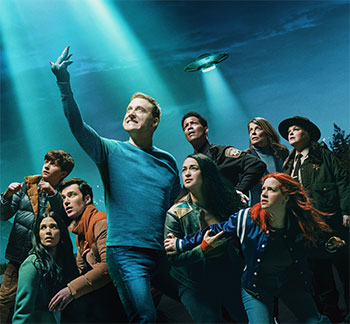
Did you know there was more Resident Alien? There is!
Last night I was umpiring playoff games, which was a reminder that we're nearing the end of 2023’s softball action for umpiring (softball action as a player ended for the year several weeks back). As the staggered-schedule late-summer leagues wrap up, there are fewer of them to go around for us umps and the last one standing will end in just a few more weeks. With luck, the remainder of my season will follow the pattern of last night, which featured many of my favorite players/teams to work with and was a fun time. It may have been a first, a shift of 3 or more games in which every game had at least two faves in it. Those are the good nights. No troubles. Or rather, even if there are troubles, they're minor and nobody raises a stink if I have to do something unconventional to make up for missing something on the field, as was the case with a weird multiple-baserunner play yesterday. Attitude is everything for umpires at this level of rec league, we're not invested in who wins (well, we're not supposed to be, anyway) we just want everyone to have a good time and to not be yelled at or belittled if we screw up a call. (And especially not when we didn't screw up a call but a player thinks we did. Those are the worst.)
Anyway, this is not an umpiring post but one about how I'm going to have a lot more free evenings going forward. Some of which will be occupied with a resumption of nerd nights here with fellow Trek geeks a couple times a month reliving the awesomeness that is Deep Space Nine, but also with new entries in our golden age of television. Such as:
- Resident Alien. While listening to a political podcast today, I heard mention of the renewal of the great Alan Tudyk show for a fourth season. All right! I thought. Quickly followed by, wait there was a third season already? How did I miss that? Turns out, yeah, the third season premiered earlier this year on a cable network, thus I completely missed it (my days as a cable subscriber have been over for a while). But knowing it exists, I will find it. If you've not seen it, the first two seasons are on Netflix. Check it out.
- Orphan Black: Echoes. The original Orphan Black series was awesome, with Tatiana Maslany expertly playing multiple roles as a woman discovers she's one of many clones and joins up with some of them to solve the mystery of their existence. This is a sequel centering on the daughter of one of the Tatiana Maslany clones, now an adult played by Krysten Ritter (who will always be Jessica Jones to me). I didn't know this even existed, but since the original was so great I will now look it up on whatever platform I can find it on. Apparently it's not a critical hit, but that isn't going to dissuade me.
- Quantum Leap. The first season of the sequel/reboot show on NBC was pretty good, but I was assuming it would be canceled, because networks tend to cancel their good genre shows before they find an audience. (Still upset about Defying Gravity? Yeah, kinda. That show would have been a big hit as a streaming show today.) But no, it got renewed and will be back in a month or so!
- Sunny (サニー). Nearing the end of its first season on Apple TV, this show appeals to me as a sci-fi show set in a near-future with "homebots" and as a show set in Japan with a fair amount of Japanese spoken. Also it stars Rashida Jones, who is always great, and a woman who goes by "Annie the Clumsy," whom I'd never heard of before but who is both funny and super-cute.
- Only Murders in the Building is back. Always fun.
- Leverage: Redemption. Again, how did I miss that this had another season? Well, it did, and I will be watching it. Moving platforms probably didn't help in terms of my missing it. It's getting a season three, too, which is cool even though it'll be on Amazon. &@%$in' Amazon.
I'll have to wait a while for Lower Decks season 5, Silo season 2, Severance season 2, The Diplomat season 2, Good Omens season 3, Outlander season 7B, and For All Mankind season 5, but those are on the way too. It's a good time to be a couch potato. Assuming you also get some exercise, of course.
2 CommentsRandom dispatches
Some stray thoughts as I procrastinate doing important(ish) stuff this afternoon...
- I had umpiring to do last night, and as I arrived at the Woodland Park ballfields I was approached by one of my favorite players to ump over the years, a guy named Stephen. His team wasn't on my schedule, they were set to play on the adjacent field that my fellow umpire was handling, but he saw me deliver a gear bag to her and came up to talk to me. A few years back, Stephen was involved in (but by no means instigated) a confrontation between players on opposing teams in a game I was officiating, and after I'd sent combatants back to their corners and resumed the game, Stephen apologized to me and owned his (minor) part in what could have been an escalation of hostilities if I'd not intervened. That impressed me since he was basically the injured party and had cause to be upset. Since that game, whenever Stephen's team and I crossed paths it made my shifts a little more fun/less stressful since I knew at least one team would be well-behaved and good-humored. Anyway, last night Stephen said, "Hey, I'm glad you're here. This is my last game and I'm moving to New York next week. It's been a lot of fun playing in the league these past years and whenever we had you for our ump you made it that much better. The team loves you. Just wanted to you to know." After his game was over we chatted a little more about what he planned to do in NYC and he reiterated his praise. I say this not to toot my own horn—OK, it's partly to toot my own horn, I do enjoy my reputation, as one fellow staff member put it, as "the Ken Griffey Jr. of umpires" in the league—but to say to the Internet masses here that, if there's someone in your associative circle you appreciate for whatever reason, let them know. Odds are they aren't getting such feedback from their boss or co-workers or whomever else that might have authority, odds are they hear negative feedback far more frequently, and it can be more than helpful to know someone appreciates their effort in doing whatever it is they do. For my part, knowing Stephen and a few others appreciate how I run a game makes it a lot more tolerable when other people insult me or otherwise make an umping shift unpleasant. I'll miss Stephen! Thankfully I still have Megan, Yoon, Dae, Frankie, Robin, and everyone on The Leftovers (among others) occasionally peppering my shifts with good cheer.
- My new car is already in the shop, though this was half-planned. I knew from the inspection I had done it needed a couple of things dealt with right away, and that was supposed to be all handled this afternoon. Unfortunately there was a parts snafu and the mechanics can't finish until tomorrow. So I'll be relying on Ye Olde Metro Transit for getting to tonight's Mariner game and back. Alas.
- Speaking of the Mariners, despite their current second-place standing behind the Houston Astros in the American League West and third behind Minnesota and Boston for the consolation-prize Wild Card position, I'm more bullish on their postseason possibility than at any point since maybe May, and they had a big lead then. All because they finally sent Scott Servais and Jarret DeHart packing. Since Dan Wilson took over last Friday, with Edgar Martinez at his side, the M's are 3-1 (against San Francisco and Tampa Bay) and have gained 1½ games on the Astros, and of those three wins I am utterly convinced that they would have lost at least two of them under the Servais regime because critical runs were scored by runners from third without benefit of a hit. Which had been a foreign concept under DeHart. Edgar made a point of telling the press that one of his goals was to emphasize situational hitting and another was to reduce strikeouts, and it paid off immediately. Even the San Francisco Giants' broadcast team noticed, as they remarked over the weekend that Seattle batters were changing their approach when they had two strikes on them, noting some guys choking up on the bat to shorten their swing and what appeared to be deliberate intent to foul off certain pitches. Shortstop Leo Rivas delivered a game-winning hit in such an at-bat on Friday. Sunday two runs scored on grounders that Julio Rodriguez and Randy Arozarena busted hard out of the box on to avoid double-plays. None of that would have happened before. Yesterday the M's beat Tampa Bay with home runs, more like the earlier regime preached, but they were "happenstance homers," not borne of swinging for the fences but of swinging for a line-drive. Josh Rojas and Luke Raley seem particularly better since the regime change; Wilson even had Rojas in the starting lineup against a lefty yesterday, something Servais never did, and what do you know, Josh was 2-for-3 against said lefty, a line single, a hard double off the wall, and lined hard just barely foul before striking out on a tough pitch. Plus he stole a base and scored the only non-homer-delivered run of the game. There have been bunts and bunt attempts in interesting situations by batters other than Luke Raley. Andres Muñoz was not called in too early from the bullpen in a close game. Surprisingly good reliever Collin "Principal" Snider was not yanked after getting in a spot of trouble but was allowed to get out of it himself. Dan is still batting Cal Raleigh third in the order, which I don't like, but it's only been four games and Victor Robles hasn't been available to lead off. We'll see if that changes soon.
- Shit, I've procrastinated too long. Gotta go.
Good news, everyone!
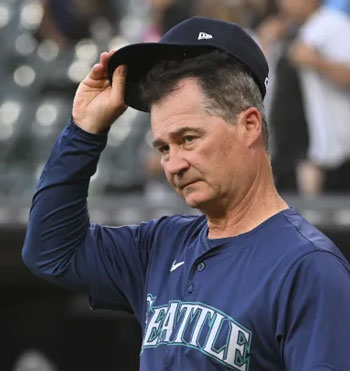
Don't let the door hit you on the way out, dude
It's been a pretty great week in the news, largely because of the absolute delight that has been the Democratic National Convention. So many standout speeches and fantastic energy that I could write long posts about and maybe will.
But not today. Because the best news from today (so far) comes from Your Seattle Mariners. The headline:
Mariners fire manager Scott Servais amid AL West slide
To quote my friend Mack, whose reaction was much like mine only slightly sanitized, "AMFT." (The A stands for "about," the T for "time," and the middle letters for a descriptor Samuel L. Jackson uses for snakes and planes.)
You may recall my posts about how the Mariners have been wildly inconsistent this year, or how they were pathetic as a club because batters having trouble had no support from their own dugout/clubhouse and had to seek help elsewhere. Or how the Mariners absolutely suck at driving in runners from third base, generally at worst a 50/50 proposition but with them 40% is a reach.
You may also recall my stance from a couple years back that the only reason the Mariners could possibly get into the postseason going forward is because we now live in the Manfred Era of participation-trophy-level playoffs and roster rules designed to protect managers from their own dumbness, and even then if the M's were to get in they wouldn't last long. And that would hold true until significant changes were made in management.
Well, someone with the power to do something about it finally reached the same conclusion.
Also canned, just as importantly, was alleged hitting coach Jarret DeHart, a primary figure in a couple of the posts linked above and a clear liability to the team.
The firings come at the conclusion of a road trip that saw the M's lose eight of nine games and fall from a first-place tie to five games behind the Houston Astros in the division. Going back a bit farther, since June 18th—when the M's held a 10-game lead over the Astros—Seattle has a winning percentage of just .377 (20-33), including 18 losses by two or fewer runs and 16 losses when their starting pitcher turned in a quality start (6+ innings with <=3 earned runs allowed). And over those 53 games, the Mariners' offense has managed to post a batting line of .208/.300/.354 with an average of 10½ strikeouts per game. For the non-baseball stat nerds, that's bad.
The frustrating thing is that none of this is new. This has been standard operating procedure for the Mariners for four years, and for longer than that no matter how good the roster of personnel was the lineup underachieved. It's astonishing that the team won 88 or more games in four of Servais' nine years at the helm, and all of the credit for that goes to the pitchers. Even there, Servais had issues—he had such a tendency to call on the worst possible option from the bullpen that I actually believe that certain relievers were traded just so Servais wouldn't keep bringing them into critical game situations (looking at you, Dan Altavilla, Ryne Stanek, Rafael Montero, Taylor Williams, et.al). Those unlikely win totals masked what I always thought were Servais' flaws and probably kept him around despite what should have been obvious reasons not to. In addition to the weird bullpen decisions there was the insistence on a three-man bench (before Manfred's reign mandated at least four), odd lineup constructions, and basic inflexibility when it came to deviating from pregame decisions regardless of what happened on the field.
Hopefully this will be a "better late than never" situation rather than one of "too little too late." The M's are still just five games out thanks to Houston's terrible start to the season. It's not likely that they can catch the Astros, but nor is it all that unlikely with five and a half weeks to go in the season (including three games in Houston).
The new manager will be Dan Wilson, former Seattle catcher and a guy who always struck me as possible manager material. He's had no coaching experience other than as a roving minor-league instructor for the M's here and there, but there have been successful big-league managers that came in cold—Craig Counsell, for one, who took Milwaukee to the postseason five times in eight years; also Aaron Boone, though when your first gig is the Yankees you're already a step up. Of course there's also David Ross and Gabe Kapler, who didn't fare so well.
No word yet on a new batting coach. That might be important. If the M's just go with DeHart's assistant for the rest of the year I doubt much will improve, but just being without DeHart should help. The rumor mill has Edgar Martínez returning to coach in some capacity. We'll see.
I've got tickets for next Tuesday night. Who wants to go?
No Comments yetTales from the ballfield

The workplace, more often than not these days
During my umpiring shift tonight, one of the teams playing was The Leftovers, one of my favorites to call games for (hi, Neal!). Unfortunately, they were on the adjacent field from me and I got stuck with other teams this time while fellow ump Ian got to do their game. Still, I had a fairly good group to work with on my field and things were mostly fine.
But I did have The Leftovers last week, and one of the fun things about them is that they record all their games and often do goofy things with the video. Last week's video didn't include any of the goofy stuff, but it did capture an argument between me and two players from the opposition team, the not-so-cleverly-named Blue Ballers, over a bang-bang call at home plate. (It may be useful to know that the Blue Baller pitcher had been getting on my nerves for a good while before this happened with snide remarks about ball/strike calls.) Usually when someone bitches at me about a call I can say, hey, it's not like we have video replay here. And that's true even when Neal and co. are recording, because I can't exactly ruin their video setup to check it. But, it does mean there's video to review after the fact. And in this case, I can definitively say that the call was...made. Was it right? Wrong? Even with video, I can't tell. Which is good, because it means the arguing players, who claimed (a) the call was made before the runner had reached home plate, and (b) that the runner never stepped on the plate, were both full of shit. Either way, I did a better job than C.B. Bucknor does on any given day, so stick it, Blue Ballers.
Nothing so dramatic tonight, just some embarrassment for me as I reverse-Denkingered a call at first base. I knew it right away, too, but I let it pass because the team it was against was leading by a ton of runs and I knew it wasn't going to matter. Except the other team started to come back. When they got within five I was nervous. Fortunately for me, their lead blew open again in the final inning and my botched call mattered not. Whew!
No Comments yet

